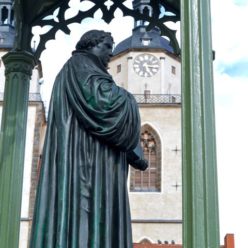O. Dolynchuk1, I. Kolesov2, D. Jehnichen3, U. Reuter3, H.-J. Radusch4, and J.-U. Sommer3
1Institute of Physics, Martin Luther University Halle-Wittenberg, Von-Danckelmann-Platz 3, 06120 Halle, Germany
2Interdisciplinary Center for Transfer-oriented Research, Martin Luther University Halle-Wittenberg, 06099 Halle, Germany
3Leibniz-Institut für Polymerforschung Dresden e.V., 01069 Dresden, Germany
4Center of Engineering Sciences, Martin Luther University Halle-Wittenberg, 06099 Halle, Germany
Crystallization of the pre-deformed polymer network under constant load can result in a non-trivial macroscopic elongation accompanied by network stiffening, which is reversible upon melting. Such actuation, known as the reversible shape-memory effect (rSME), is in focus due to fundamental interest of underlying molecular mechanisms and numerous potential applications. The rSME was studied in cross-linked linear poly(ε-caprolactone) (PCL) under various constant loads [1]. A striking rSME under stress-free conditions was found in PCL with the highest obtained cross-link density. The viscoelastic and thermal properties of the material as well as size and orientation of the crystals formed in PCL networks under and without load were investigated. As concluded, the directed growth of crystals is the origin of the reversible actuation in both loaded and free-standing PCL. The mean field approach was employed to calculate the free energy change during non-isothermal crystallization of PCL networks under load, whereby the possible morphology and orientation of crystals were analyzed. The analytical results on the nanocrystalline structure along with fitting curves of the temperature dependent strain, which were obtained by modeling the SME in PCL under load, are in good accordance with experimental findings.
References
[1] O. Dolynchuk, I. Kolesov, D. Jehnichen, U. Reuter, H.-J. Radusch, J.-U. Sommer, Macromolecules 50, 3841 (2017). (link)
